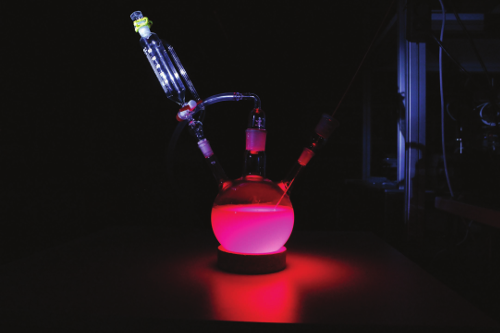PDW (Partner Lead: PDWA)
Photon Density Wave (PDW) spectroscopy is an inline process analytical technology (PAT) capable of calibration-free quantification of light absorption and light scattering in highly turbid, highly concentrated liquid dispersions, even under strong stirring conditions. The experimental results are expressed as absorption coefficient and reduced scattering coefficient, being the absolute optical properties of the turbid material. While the absorption coefficient is linked to the chemical composition (Lambert-Beer law) of the dispersion, the reduced scattering coefficient is linked to the size, concentration, and morphology of the dispersed particles, droplets, or cells.
Experimentally, intensity-modulated light is inserted with an optical fiber acting as a point-like light source in a strongly light scattering and weakly absorbing material. Due to absorption and multiple scattering of the intensity modulated light, a photon density wave is created inside this dispersion. As function of emitter/detector-fiber distance and modulation frequency, shifts of the amplitude and the phase of the photon density wave are characterized experimentally. Based on Mie theory and theories for so-called dependent light scattering, particle sizes can be obtained from the reduced scattering coefficient.

Recently, PDW spectroscopy has been applied successfully to cooling crystallization processes prone to process probe fouling with mass fractions of 60 %, depletion-Induced flocculation processes in concentrated food emulsions, real-time inline monitoring of zeolite syntheses, inline monitoring of Polyhydroxyalkanoate (PHA) production during high-cell-density plant oil cultivations, or inline monitoring of latex-particle size during emulsion polymerizations with a high polymer content of more than 60 %.
For NanoPAT, PDW spectroscopy is expected to provide for the first time real-time process information on challenging nano particle syntheses in an industrial context of significant value creation. Thus, it is anticipated that the PDW technology will contribute to more efficient industrial processing.